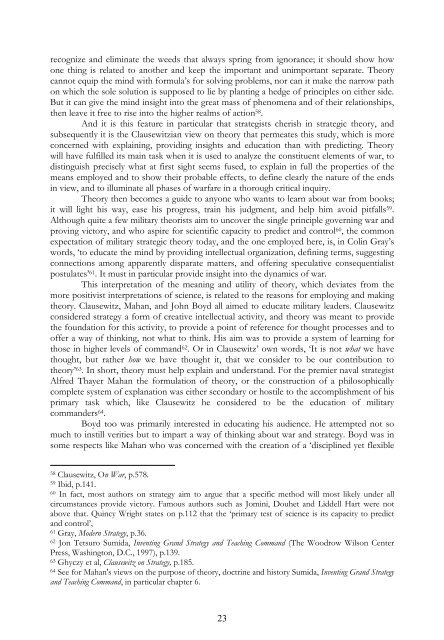Science, Strategy and War The Strategic Theory of ... - Boekje Pienter
Science, Strategy and War The Strategic Theory of ... - Boekje Pienter
Science, Strategy and War The Strategic Theory of ... - Boekje Pienter
You also want an ePaper? Increase the reach of your titles
YUMPU automatically turns print PDFs into web optimized ePapers that Google loves.
ecognize <strong>and</strong> eliminate the weeds that always spring from ignorance; it should show howone thing is related to another <strong>and</strong> keep the important <strong>and</strong> unimportant separate. <strong>The</strong>orycannot equip the mind with formula’s for solving problems, nor can it make the narrow pathon which the sole solution is supposed to lie by planting a hedge <strong>of</strong> principles on either side.But it can give the mind insight into the great mass <strong>of</strong> phenomena <strong>and</strong> <strong>of</strong> their relationships,then leave it free to rise into the higher realms <strong>of</strong> action 58 .And it is this feature in particular that strategists cherish in strategic theory, <strong>and</strong>subsequently it is the Clausewitzian view on theory that permeates this study, which is moreconcerned with explaining, providing insights <strong>and</strong> education than with predicting. <strong>The</strong>orywill have fulfilled its main task when it is used to analyze the constituent elements <strong>of</strong> war, todistinguish precisely what at first sight seems fused, to explain in full the properties <strong>of</strong> themeans employed <strong>and</strong> to show their probable effects, to define clearly the nature <strong>of</strong> the endsin view, <strong>and</strong> to illuminate all phases <strong>of</strong> warfare in a thorough critical inquiry.<strong>The</strong>ory then becomes a guide to anyone who wants to learn about war from books;it will light his way, ease his progress, train his judgment, <strong>and</strong> help him avoid pitfalls 59 .Although quite a few military theorists aim to uncover the single principle governing war <strong>and</strong>proving victory, <strong>and</strong> who aspire for scientific capacity to predict <strong>and</strong> control 60 , the commonexpectation <strong>of</strong> military strategic theory today, <strong>and</strong> the one employed here, is, in Colin Gray’swords, ‘to educate the mind by providing intellectual organization, defining terms, suggestingconnections among apparently disparate matters, <strong>and</strong> <strong>of</strong>fering speculative consequentialistpostulates’ 61 . It must in particular provide insight into the dynamics <strong>of</strong> war.This interpretation <strong>of</strong> the meaning <strong>and</strong> utility <strong>of</strong> theory, which deviates from themore positivist interpretations <strong>of</strong> science, is related to the reasons for employing <strong>and</strong> makingtheory. Clausewitz, Mahan, <strong>and</strong> John Boyd all aimed to educate military leaders. Clausewitzconsidered strategy a form <strong>of</strong> creative intellectual activity, <strong>and</strong> theory was meant to providethe foundation for this activity, to provide a point <strong>of</strong> reference for thought processes <strong>and</strong> to<strong>of</strong>fer a way <strong>of</strong> thinking, not what to think. His aim was to provide a system <strong>of</strong> learning forthose in higher levels <strong>of</strong> comm<strong>and</strong> 62 . Or in Clausewitz’ own words, ‘It is not what we havethought, but rather how we have thought it, that we consider to be our contribution totheory’ 63 . In short, theory must help explain <strong>and</strong> underst<strong>and</strong>. For the premier naval strategistAlfred Thayer Mahan the formulation <strong>of</strong> theory, or the construction <strong>of</strong> a philosophicallycomplete system <strong>of</strong> explanation was either secondary or hostile to the accomplishment <strong>of</strong> hisprimary task which, like Clausewitz he considered to be the education <strong>of</strong> militarycomm<strong>and</strong>ers 64 .Boyd too was primarily interested in educating his audience. He attempted not somuch to instill verities but to impart a way <strong>of</strong> thinking about war <strong>and</strong> strategy. Boyd was insome respects like Mahan who was concerned with the creation <strong>of</strong> a ‘disciplined yet flexible58 Clausewitz, On <strong>War</strong>, p.578.59 Ibid, p.141.60 In fact, most authors on strategy aim to argue that a specific method will most likely under allcircumstances provide victory. Famous authors such as Jomini, Douhet <strong>and</strong> Liddell Hart were notabove that. Quincy Wright states on p.112 that the ‘primary test <strong>of</strong> science is its capacity to predict<strong>and</strong> control’,61 Gray, Modern <strong>Strategy</strong>, p.36.62 Jon Tetsuro Sumida, Inventing Gr<strong>and</strong> <strong>Strategy</strong> <strong>and</strong> Teaching Comm<strong>and</strong> (<strong>The</strong> Woodrow Wilson CenterPress, Washington, D.C., 1997), p.139.63 Ghyczy et al, Clausewitz on <strong>Strategy</strong>, p.185.64 See for Mahan's views on the purpose <strong>of</strong> theory, doctrine <strong>and</strong> history Sumida, Inventing Gr<strong>and</strong> <strong>Strategy</strong><strong>and</strong> Teaching Comm<strong>and</strong>, in particular chapter 6.23
















